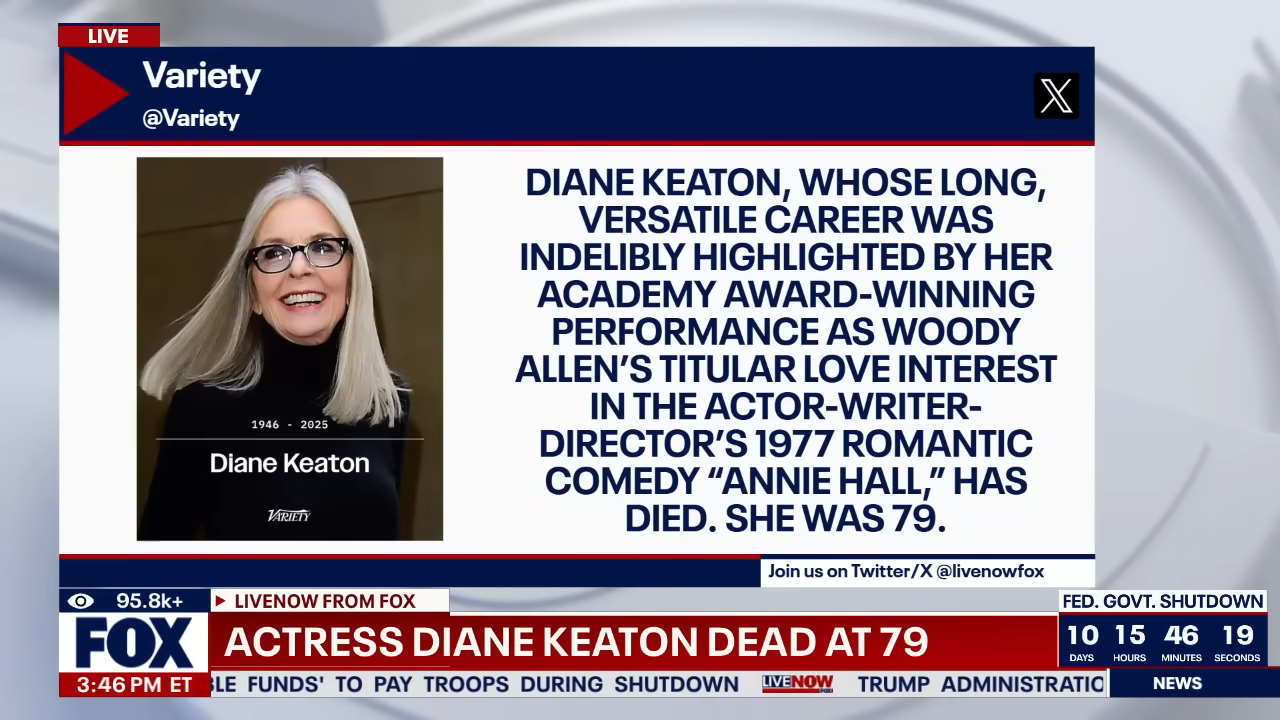The world has lost a legend. Diane Keaton, the Oscar-winning actress who became synonymous with quirky, offbeat characters and groundbreaking roles, passed away at the age of 79. Her death marks the end of a remarkable career that spanned over five decades, one that forever shaped the way we view women in Hollywood.
Keaton was beloved for her unique presence on screen. Her career took off with her iconic role as Kay Adams in The Godfather (1972), where she portrayed the wife of Michael Corleone with a perfect blend of grace and vulnerability. However, it was her unforgettable portrayal of the neurotic, free-spirited Annie Hall in Annie Hall (1977) that truly cemented her place in cinematic history. The role won her an Academy Award for Best Actress and became a defining part of her career.
But Keaton was more than just a talented actress. She was a cultural icon, known for her quirky style and unapologetic approach to life. From her early collaborations with Woody Allen to her later roles in The First Wives Club (1996) and Something’s Gotta Give (2003), Keaton played characters who were both relatable and inspirational. She brought depth to every role, portraying women who were independent, self-assured, and, at times, wonderfully flawed.
Diane Keaton’s Health Struggles: A Life of Challenges
Despite her professional successes, Diane Keaton’s personal life was not without its challenges. Though details surrounding her death are still unclear, her health had reportedly declined sharply in recent months. No official cause of death has been released, and her family has requested privacy during this difficult time.
Keaton had been open about her struggles with bulimia, a condition she battled in her early years in Hollywood. She spoke candidly in interviews about how the pressure of maintaining a certain image in the public eye affected her mental and physical health. In addition to bulimia, Keaton also faced health challenges related to skin cancer, which she bravely discussed as she grew older. These struggles were a part of her complex, multifaceted life, one that she navigated with honesty and strength.
In interviews, Keaton would often reflect on her vulnerabilities. Despite her fame and successes, she was not immune to the insecurities that many women face—especially in an industry that can be unforgiving toward aging actresses. Keaton defied those pressures, refusing to let Hollywood’s ageism dictate her career choices. As she got older, she continued to take on roles that were meaningful to her, proving that women in Hollywood could still be relevant and vibrant well into their later years.
A Career Beyond Film: Diane Keaton’s Lasting Impact
Keaton’s impact extended far beyond her film career. In addition to acting, she was a gifted photographer and an author. She released her memoir, Then Again, in 2011, offering readers a glimpse into her creative mind and the personal experiences that shaped her career. Her interest in photography also led her to document her life and surroundings, capturing moments with the same careful, artistic eye she applied to her acting.
Keaton’s legacy is not just in the roles she played, but in how she shaped the perception of women in the entertainment industry. She was a woman who navigated Hollywood’s often rigid expectations with grace and authenticity. She refused to be boxed in by stereotypes and instead carved out a career that allowed her to evolve and grow, just as we all do.

She never married but instead chose to adopt two children, Dexter and Duke, in her 50s. Her decision to build a family on her own terms was one that resonated with many. Keaton was not defined by traditional norms or expectations. She made her own path and encouraged others to do the same, proving that family doesn’t have to look one specific way and that life’s greatest joys can come from the most unexpected places.
Reflecting on a Life Well Lived
As we remember Diane Keaton, we are reminded of the many ways she defied expectations. She didn’t just break boundaries in Hollywood; she reshaped them. Her portrayal of women on screen was revolutionary, presenting them not as one-dimensional characters but as individuals full of complexity, strength, and vulnerability. Through her work, she helped redefine the roles that women could play in film, showing us that aging, independence, and authenticity were not weaknesses but sources of power.
Keaton’s death is a moment for us to pause and reflect not only on her achievements but also on the kind of person she was. She was authentic, bold, and always true to herself. She embraced her imperfections and turned them into some of the most memorable performances in cinematic history. The loss of such an iconic figure leaves a void in the entertainment industry that will not be easily filled.
As Hollywood mourns the passing of Diane Keaton, we celebrate her legacy—the films, the roles, the lessons, and the authenticity that will continue to inspire generations to come.
Table: Diane Keaton’s Biography
| Attribute | Details |
|---|---|
| Full Name | Diane Hall Keaton |
| Date of Birth | January 5, 1946 |
| Date of Death | October 11, 2025 |
| Age at Death | 79 |
| Place of Birth | Los Angeles, California, USA |
| Famous For | The Godfather (1972), Annie Hall (1977), Father of the Bride (1991), The First Wives Club (1996) |
| Oscar Nominations | Best Actress for Annie Hall (1977) |
| Other Professions | Author, Photographer, Director |
| Personal Life | Never married, adopted two children (Dexter and Duke) |
| Notable Health Struggles | Bulimia, skin cancer |
Diane Keaton’s death may have left us with many questions, but her life and work remain an enduring testament to her legacy. Her films continue to inspire, and her impact on Hollywood and the world of entertainment will never be forgotten.